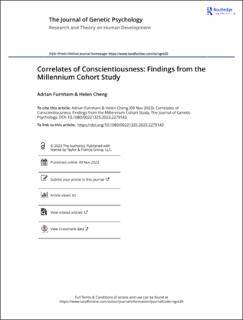| dc.contributor.author | Furnham, Adrian | |
| dc.contributor.author | Cheng, Helen | |
| dc.date.accessioned | 2023-11-25T10:16:03Z | |
| dc.date.available | 2023-11-25T10:16:03Z | |
| dc.date.created | 2023-11-20T07:57:29Z | |
| dc.date.issued | 2023 | |
| dc.identifier.citation | The Journal of Genetic Psychology. 2023, . | |
| dc.identifier.issn | 0022-1325 | |
| dc.identifier.uri | https://hdl.handle.net/11250/3104635 | |
| dc.description.abstract | This study explored correlates of the trait Conscientiousness drawing on longitudinal data from the Millennium Cohort Study (MCS), with a sample of 7,436 mothers. Data were collected when participants’ children were born and again at ages nine months, 3, 11, and 14 years. Structural equation modeling showed that the family poverty indicator, self-esteem, parent-child relationship, children’s behavioral problems, and education all had significant and direct effects on maternal trait Conscientiousness. The strongest predictor was self-esteem (measured over 13 years previously), followed by children’s behavioral problems and parent-child relationship quality. The implications for helping mothers and their children are considered and limitations are discussed. | |
| dc.description.abstract | Correlates of Conscientiousness: Findings from the Millennium Cohort Study | |
| dc.language.iso | eng | |
| dc.title | Correlates of Conscientiousness: Findings from the Millennium Cohort Study | |
| dc.title.alternative | Correlates of Conscientiousness: Findings from the Millennium Cohort Study | |
| dc.type | Peer reviewed | |
| dc.type | Journal article | |
| dc.description.version | publishedVersion | |
| dc.source.pagenumber | 10 | |
| dc.source.journal | The Journal of Genetic Psychology | |
| dc.identifier.doi | 10.1080/00221325.2023.2279143 | |
| dc.identifier.cristin | 2198582 | |
| cristin.ispublished | true | |
| cristin.fulltext | original | |
| cristin.qualitycode | 1 | |
